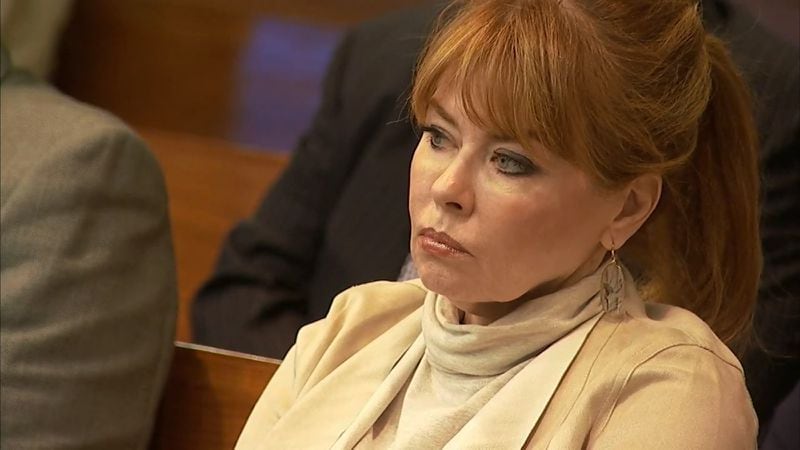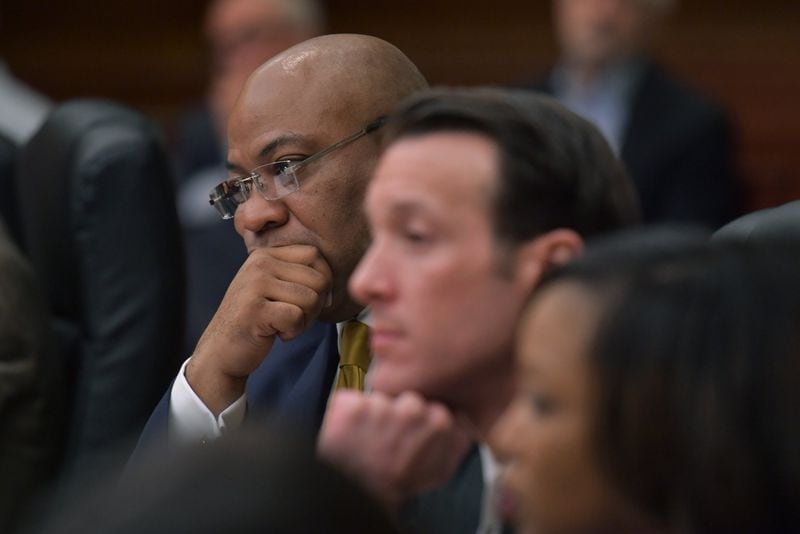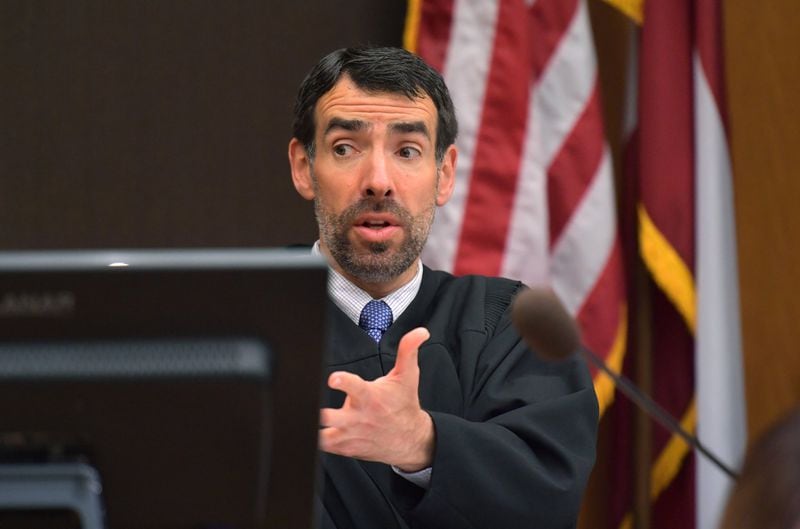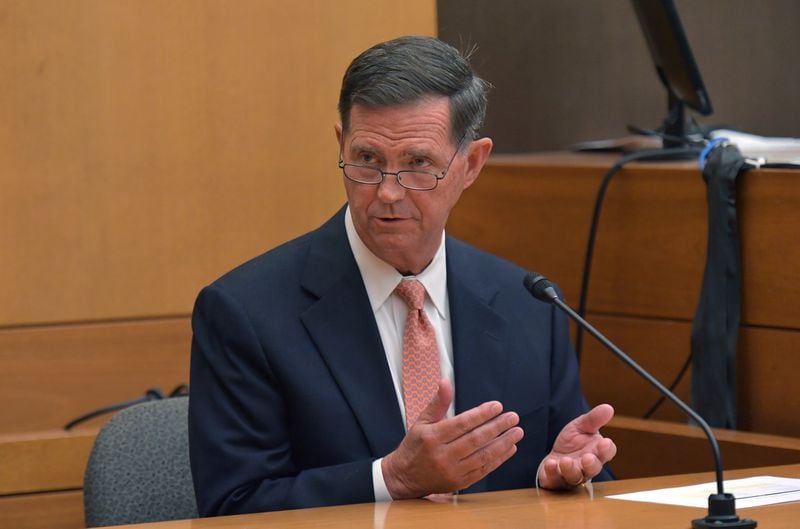Less than 24 hours after the state rested in the Claud "Tex" McIver trial, the defense's job got a little easier.
Two of the three charges for influencing a witness were thrown out by Fulton County Superior Court Judge Robert McBurney. Count 6 involved McIver's request that former spokesman Bill Crane amend statements given to the media injecting Black Lives Matter into the case. Count 7 referred to the desperate voicemail — "Dani is about to send me to prison" — the defendant left for Thomas Carter, the husband of Dani Jo Carter, the sole witness to the fatal shooting inside the McIver's Ford Expedition.
If convicted, McIver faced up to five years in prison on each count.
IN-DEPTH: Will long case come up short for prosecution in Tex McIver trial?
Regarding Count 7, defense co-counsel Don Samuel argued the indictment, which stated McIver and his team was “imploring (Dani Jo Carter) to stop communicating,” contradicted their actual intent.
“Never was that phone call interpreted by anybody, and there’s nothing else, other than what the words on the phone call are, to say don’t go talk to the police, stop talking to the police,” he said. “It was the exact opposite. And, again, the interpretation comes from all the witnesses who say, ‘We hid out from the limousine.’ Remember they were sending a limousine to go pick her up.”
McIver wanted her to go public with her story because he was being vilified, Samuel said.
Credit: Channel 2 Action News
Credit: Channel 2 Action News
He pulled no punches when discussing Count 6.
“Seriously, if they’re saying lying to the press — lying to the press, right? — is a crime then there are a lot of us who are in trouble,” Samuel said.
The judge agreed that, “in fact, what Mr. McIver was trying to do, as Mr. Samuel said rather animatedly yesterday, was to get her to talk, not to law enforcement, but to Mr. Maples, a court reporter, etcetera. It didn’t have anything to do with law enforcement directly.”
And withholding information from the media, McBurney ruled, is not a crime.
Here’s what else transpired on the first full day of defense testimony:
Everything you ever wanted to know about sleep …
Although their stories varied, Dani Jo Carter and Tex McIver both stated that McIver had dozed off before asking for his .38 revolver and again before firing the bullet that killed Diane. Prosecutors cast doubt on the second part of that story, saying it's unlikely someone awake enough to retrieve his gun would fall back asleep within 10 minutes, weapon in hand. Then, the defense theory goes, something jolted McIver from his slumber, causing him to inadvertently squeeze the trigger.
McIver, according to defense expert David Rye, an Emory University sleep medicine specialist, suffered from REM behavioral disorder, which could lead to him physically acting on a dream.
Rye told the jury that McIver had complained of sleep problems for years and took part in a sleep study at the Mayo Clinic in Jacksonville to try to address the issue back in 2004. In a subsequent examination, conducted over one night in Rye’s lab this year, McIver demonstrated patterns consistent with the disorder, falling asleep in two minutes. Rye testified he also observed McIver, five minutes into a nap, “(fall) directly into a dream.”
The state wasn’t impressed, referring to Rye’s conclusions as “scientific hearsay.” Prosecutor Adam Abbate noted Rye also diagnosed McIver with “confusional arousal,” a sleep disorder that causes sufferers to act in a strange and confused manner upon waking.
Abbate asked if the diagnosis was made only after he shot his wife.
“Correct,” Rye answered.
Bet on the state calling its own sleep expert as a rebuttal witness.
Back during the trial’s first week, Emory University Hospital nurse Shahinda Cyclewala testified she overheard Tex McIver offer a truly bewildering explanation about his wife’s shooting.
“I heard him say and this is what I heard, and it was in passing, I was passing through: ‘I was cleaning my gun in the bathroom and I shot her,’” Cyclewala said. Diane McIver was still in a wheelchair at the time, she said.
This, the prosecution alleged in its opening statement, was one of six accounts of the shooting offered up by McIver.
Samuel pressed her hard but Cyclewala didn’t budge.
Samuel: “You’re saying this didn’t happen while she was being put in the bed but while she was still in the wheelchair?”
Cyclewala: “Yeah.”
Samuel: “And there were two nurses right behind her pushing the wheelchair?”
Cyclewala: “Right. Nobody was standing. Everybody was in a hurry.”
So the defense recalled the two nurses she mentioned. Blair Brown said Wednesday she was about 18 inches away from McIver at the time.
“Did you hear Tex McIver say, ‘I shot her in the bathroom while I was cleaning the gun?’ Samuel asked.
Brown said no. Samuel later repeated the question to Allison Neely, who was pushing Diane McIver in her wheelchair into the emergency room, and got the same answer.
Of all of Tex McIver’s missteps following his wife’s death, his decision to sell off more than 2,000 items from her wardrobe — including designer dresses, her large hat collection, scores of shoes and more than 100 fur coats — seemed particularly ill-advised.
Meet the man who advised him to do it.
Attorney Stanley Smith said selling off some of Diane McIver’s non-cash assets would help McIver pay $350,000 in cash bequests laid out in her will. Smith testified that after evaluating her estate, he advised McIver to sell her clothing, jewelry and furs because those items were “wasting assets” that would only lose value over time.
“If you waited until the next year, they could go out of style and the value could go down,” Smith said.
What happened Wednesday: Two witness influencing charges against McIver were dropped as the 75-year-old lawyer's attorneys began to mount their defense.
What's next: Only two more days of testimony? It's possible, the judge told jurors Wednesday. If so, deliberations could begin as soon as Monday afternoon.
About the Author










